- Home
- Chaim Potok
In the Beginning Page 6
In the Beginning Read online
Page 6
“He likes you,” my father had announced.
“Be careful he doesn’t bite your hand, David,” my mother warned, holding tightly to my brother’s hand.
The goat’s lips left a tickling sensation on my open palm. I laughed with delight.
“Silly billy goat,” I said through the wire-mesh fence of the pen. “My nice silly billy goat.”
“Dote,” my brother said, straining to approach the fence. “Dote.”
“No,” my mother said, and held him back.
“My nice nice nice silly billy goat,” I said, and felt very happy.
“Come,” my father said. “We will be late.”
And we were. But it had made no difference. They had expected us to be late. They often talked about that, my father and uncle.
“People who arrive late show they don’t really want to come at all,” my uncle had once said mildly, with a short laugh.
“From what book did that pearl come?” asked my father. His voice was vaguely annoyed.
My uncle named a title and an author.
“A treasury of wisdom,” my father said derisively. “For such wisdom you crossed an ocean and came to America?”
“Just coming to America was wisdom enough,” said my uncle.
“Yes,” said my father quietly after a moment, nodding approval. “That was wisdom.”
And over my uncle’s gentle features had come a pink flush of pleasure at my father’s words. Now I recalled vaguely a similar moment in Mr. Bader’s apartment. Where had my father and uncle said that to one another about arriving late and coming to America? In our house? Sometimes they sat in the living room for hours, talking quietly. But I could not remember. For some reason it disturbed me not to be able to remember that.
I bent and touched the grassy earth of the clearing. I skimmed the open palm of my hand back and forth over the low grass. The grass tickled the palm of my hand. My nice nice nice silly billy goat.
“David,” I heard my Aunt Sarah call from her blanket. “What are you doing there all alone? Come here and say hello to me.”
I moved reluctantly into the clearing and crossed to where my aunt was seated. The sun had gone behind a layer of very thin clouds.
“Come here and give me a kiss,” my aunt said, smiling and peering out at me from beneath the very wide brim of a flowery yellow hat. She had on a loose-fitting, pale blue summer dress. Her face was beautiful. She had long dark lashes and dark arching eyebrows. I kissed her cool cheek. She smelled of sweet perfume. Her short hair tickled my neck. I liked her but I did not like to kiss her. It was like kissing a wind: she was there and not there. Even as I kissed her she was poking and prodding me and talking.
“You are all bones,” she chided, lowering her eyelids and turning to my mother. “The boy should have tonic. Do you give him tonic?”
“Yes,” my mother answered very quietly from the adjoining blanket where Saul and my brother were rolling and laughing. “Tonic, cod-liver oil, sweet cream, everything.”
“Then you should take him to a doctor.”
“I took him to a doctor.”
“What did he say?”
“That we should give him tonic, cod-liver oil, and sweet cream.”
“Bones,” my aunt said, turning back to me. “Look at you. You should go to the country and rest and eat.”
“Soon,” my mother said. “Perhaps even in middle or late July. Everything here is”—she hesitated—“ready.”
“Yes,” my aunt said softly. “We will be going about then also.” She gazed at my mother. “It will be good to see them.”
“Master of the Universe,” my mother said, her eyes blinking. “Yes, it will be good to see them.”
“Ouch!” Saul said loudly. “Watch it! You just hit my lip! Are you strong!” He let my brother roll over on top of him.
“This hat was a bargain,” my aunt said to my mother. “You need a new hat, Ruth.”
“Where are the others?” my mother murmured.
“They’ll be here soon. There’s a hat store on Fordham Road, Ruth. You really need a new hat.”
I moved slowly away from them. They did not notice me. My father and uncle stood beneath a tree at the far end of the clearing, talking quietly. I moved toward the path we had taken through the wood. At the point where the path entered the clearing, I sat down in a patch of shade and waited for the faint throbbing behind my eyes to move into my forehead and become cruel pain. I did not think I would be able to play the picnic games today. If I was quiet and behaved myself during the meeting, my father had promised, then, after the soccer game and the wrestling, he would play with me—some running games and crawling games and hide-and-go-seek. I felt faintly shivery with the dark edge of oncoming fever. I could not remember the last time I had played a running game or a game with a ball. Mostly I played marbles. I would play with Tony Savanola and sometimes even with Joey Younger when he wasn’t running around wildly or being a busybody. A while back I had come out of the house with a pocketful of marbles and had found Tony Savanola playing with a boy I did not recognize.
“Hey, Tony,” I had said eagerly, coming up to them. It was a bright day. The maples were full and green with leaves. It felt good to be outside. I had been ill a very long time and my legs were weak. I longed to play with a friend.
Tony Savanola had looked up from the game and his olive-skinned features had taken on a look of happy surprise and then, almost immediately, of caution.
“Hey, Davey,” he said, and glanced warily at the new boy, who was getting slowly to his feet from a kneeling position over the marbles game. I saw that the new boy’s knees were red and pitted from the sidewalk. He was two inches taller than I, had pale blond hair and very pale gray eyes, and was dressed in shorts, a polo shirt, and sneakers. His eyes had a strange, half-closed, sleepy look to them, and his lips were small and thin. He looked to be about six years old.
“Can I play?” I asked eagerly.
“We’re in the middle of a game, Davey.”
“Can I play when you’re finished? I got some good immies, Tony.”
“I don’t know,” Tony Savanola said uncertainly. He looked at the new boy. “This is Eddie Kulanski,” he said, as if to explain his wariness.
“I’m Davey Lurie,” I said.
“Are you the kid that’s always sick?” Eddie Kulanski asked.
“What?” I said.
“Hey, Eddie,” Tony said quietly.
“We don’t want your germs,” Eddie Kulanski said.
“What?” I said again, feeling the weakness in my legs, and my heart suddenly leaping and pounding.
“Come on,” Eddie Kulanski said to Tony, and got back down on the sidewalk. “It’s my shot.”
“I’ll play with you later, Davey,” Tony said.
They played as if I were not there. After a few minutes I turned and walked away. I went into the house and carried out the tricycle my father had given me a few weeks back after another of my lengthy periods in bed. I rode around slowly for a while. Eddie Kulanski and Tony Savanola finished their game and began another. The street was busy with traffic. Children ran about on the sidewalk; women shopped; an old man sat on a chair near a stoop, his wrinkled face to the sun. A horse and wagon clattered by on the cobblestones. From time to time I checked my little brother, who lay asleep in his carriage near our front stoop. Riding up the block slowly beneath the trees, with the broken sunlight and the late spring air on my face, I forgot Tony Savanola and Eddie Kulanski. I began to love the tricycle; I felt free on it; I could move easily; and there was the wind on my face and in my ears.
Joey Younger turned the corner of the block on a slanting run, saw me on the tricycle, and stopped. He trotted over to me, turned, and kept pace with me as I continued riding. He ran effortlessly, his brown hair wild, his face streaked with dirt and sweat.
“Hey, give me a ride, Davey,” he said.
“Soon,” I said. “Come on, Davey.”
“To the corner
and back,” I said. My legs had begun to tire. I rode over to my brother’s carriage and dismounted. I saw Joey Younger look at Eddie Kulanski and Tony Savanola. His thin, long-nosed face hardened. He leaned toward me confidentially. I could smell the sweat on him. His thin rangy body seemed to radiate sweat and heat.
“That’s Eddie Kulanski,” he said in a low voice.
I nodded to indicate he was not telling me anything I did not already know.
“I had a fight with him. He called me a dirty Jew. He beat me up and my mother and his mother screamed at each other. They’re Polaks.”
I said nothing and watched Tony Savanola lean forward expertly for a marble shot. He struck the marble, pocketed it, and leaned forward again. Eddie Kulanski saw me looking at them. His lips moved briefly but I heard nothing. He turned away from me.
“To the corner and back,” Joey Younger said. “You want to race me?”
“You know I can’t do that, Joey. Why do you keep asking me to do things you know I can’t do?”
He pedaled away on the tricycle, leaning forward into the wind, his hair blowing wildly.
I sat down on the chair next to my brother’s carriage and closed my eyes and rested. The sounds and smells of the street moved warmly against me.
“Hey, Davey.” It was Joey Younger’s voice. “Can I have another ride?”
I nodded without opening my eyes and heard him speed away. Another horse and wagon clattered by. How good it was to be outside on the street!
“Davey?” It was Tony Savanola.
I opened my eyes wide.
He smiled uncertainly. “You want to play now, Davey?”
I looked up and down the block.
“He had to go inside,” Tony Savanola said.
“Sure I want to play, Tony.”
We played quietly together while Joey Younger rode my tricycle wildly up and down the block. Once he almost ran it into a baby carriage outside the grocery at the far end of the street.
“I don’t think I like Eddie Kulanski,” I said to Tony Savanola at one point during the game. “He called Joey a dirty Jew. Why did he call him that?”
“He hates Jews. His father says Jews killed Jesus.”
“Really? I never heard that.”
“Good shot, Davey. My father says Jews didn’t kill Jesus. He says Jews never killed people by putting them up on crosses. Only the Romans did that.”
“Who are the Romans?”
“The ones who came before the Italians. They once owned the country where the Jews lived.”
“Why do you play with him, Tony?”
“That was another good shot. I can’t not play with him, Davey. We go to the same church. Next year we’ll go to the same Catholic school. Hey, you’re cleaning me out, Davey.”
“I’ll loan you some.”
“That was a good game. Boy, you sure cleaned me out.”
In the afternoon Eddie Kulanski was back down on the street. Tony Savanola played with him. I rode my tricycle for a while, grew weary, parked it in its place beneath the stairway in the entrance hall of our apartment house, and sat in the sun near my brother’s carriage. Weary with the morning and afternoon, my leg muscles still twitching from my brief afternoon of wheeling about on the tricycle, I fell into a light floating half-sleep through which the sounds of the street came to me dimly as if filtered through the sheet I sometimes put over my head while lying in bed. I loved the milky white world beneath the sheet; it was my very private world. I was a lion and a tiger and an elephant in that world. I was the giant Og on Noah’s ark in that world, my sheet-covered, milky-white bed world. I sat half asleep and listened dreamily to the street.
I thought I felt something hit my shoulder but knew I was dreaming it and did not open my eyes. Again, something struck my shoulder, hard this time. I sat up and opened my eyes and found myself looking into the pale-blue sleepy eyes of Eddie Kulanski. I sat up very straight.
He stood in front of me. “You get sick all the time,” he said. He held his hands on his hips as he spoke. “What’re you sick from?”
I felt the dryness in my throat and the quivering in my legs and was quiet.
“You got some kind of Jewish disease or something?”
“No,” I heard myself say.
“What’re you sick from?”
“I don’t know.”
“You got a Jewish disease.”
“Go away.”
“What?”
“Go away. Leave me alone.”
“Who’re you telling to go away? You think you own the sidewalk? You own all the money, but you don’t own this here sidewalk.”
“What?”
“You want to try and make me go away?”
“Please,” I said. “I don’t want to fight.”
“Please, I don’t want to fight,” he mimicked cruelly.
“I didn’t do nothing to you. Leave me alone. I’ll tell my mother.”
“Tell your mother. Tell your father so he’ll come yelling to my father and my father will beat him up good.” Eddie Kulanski’s father was a very tall man with long muscular arms and a hard, ruddy, cruel face. “And listen, you stay away from my friend. Tony is my friend and you stay away from him.” He seemed to notice my brother’s carriage for the first time. He took a step forward and peered into it, raising himself on his toes.
I got quickly to my feet. “Get away,” I said.
He stepped back slowly, taking his time. “That your kid brother?” he said. His sleepy eyes had a strange flat look.
“You get away from him,” I said, raising my voice.
He said something I did not understand. Then he said, “Don’t tell me what to do, you Jew creep.”
I stared at him. The blood was beating in my head. I would have another nosebleed. Right in front of him I would suddenly have a nosebleed. And he would laugh. My legs were shaking and trembling. I could hear the trembling in my voice as I spoke.
“You leave me alone,” I said. “I never did nothing to you. I never killed no one.”
He seemed vaguely surprised. His sleepy eyes widened a little. Then he said, “Your old man’s from Poland?”
“What?”
“Tony says your old man’s from Poland.”
“From Poland, yes.”
“Anonymowe Panstwo,” he said harshly, as if mouthing a vile epithet.
“What?”
“Anonymowe Panstwo,” he repeated. “And keep your Jew face away from my friend Tony.”
He turned, went up the stoop of our apartment house, and disappeared inside.
I felt myself sliding back onto the chair. I sat very still, thinking none of it had really happened, I had had a nightmare during a daytime sleep. I had had such daytime dreams before. I sat there and listened to the terrible beating of my heart.
I did not tell my parents. I stayed away from Tony Savanola all that week. I sat on the chair near my brother’s carriage or rode on my tricycle. My legs were stronger now than they had been at the start of the week. I really loved the tricycle. When I rode it I did not mind too much watching Tony Savanola and Eddie Kulanski playing together. But when I sat resting on the chair near my brother’s carriage I did not like looking at them. I would close my eyes and think I was in the milky world beneath my sheet.
One day that week strange boys came into our block from another street and played rough games with Eddie Kulanski and Tony Savanola. They played in front of our house and woke my brother and I pushed the carriage to the next house and then carried the chair over to the carriage. The chair was very heavy in my quivering arms. They played noisily until Tony Savanola’s mother put her head out of her window and shouted, “Hey, you boys, where you think you are, in a jungle? You play quiet or you get away from here, or I call the police!”
They quieted down immediately. After a few minutes they sauntered off. Eddie Kulanski went with them, leaving Tony Savanola alone in front of the house.
I saw Tony Savanola start up the stoop, then stop
and turn to look at me. He smiled wanly and waved. Then he went slowly down the stoop and came over to me.
“Hey, Davey,” he said, trying another smile.
“Tony,” I said quietly.
“How do you feel?”
“I’m okay now.”
“You look better, Davey.” He hesitated. “You want to play me immies?”
“Eddie Kulanski said—”
“I know what he said. My mother says I shouldn’t listen to him. You want to play me immies?”
“Sure, Tony.”
“I’ll loan you some.”
We played three wonderful games. Near the end of the fourth game, Eddie Kulanski came slowly up the street, passed us stiffly with a quick glance, and went into the house. I was sweating and trembling and had difficulty holding my marble in my hand. It slid from my fingers into a wildly careering shot.
“He won’t do nothing to you,” Tony Savanola said quietly. “He just talks a lot.”
I hung my head.
“Why you so scared of him, Davey?”
“I don’t know.”
“Take that shot over again, Davey. It don’t count when it slips like that.”
“Saul,” I said that Shabbat afternoon after my cousin had finished telling me a story from the midrash, “what does Anonymowe Panstwo mean?”
“What does what mean?”
“Anonymowe Panstwo.”
“Is it Polish?”
“Yes.”
“I don’t know Polish. Did you ask your mother or father?”
“I don’t want to,” I said, and told him about Eddie Kulanski.
We were in his room and the June sun streamed in through his window. But his thin face darkened and his eyes became a little frightened behind their shell-rimmed glasses.
“You ought to tell your father,” he said.
“No,” I said. “Give me your word you won’t tell.”
He was silent.
“Give your word,” I said. “Please.”
“I give my word,” he said reluctantly. “But you stay away from him.”
“I don’t like him,” I said. “Why should I go near him?”
But the next day Eddie Kulanski came over to me along with a tall, blond-haired boy who looked about eleven or twelve. I sat on my chair near my brother’s carriage and watched them come out of the apartment house, walk down the stoop, and start toward me. They looked like twins except that Eddie Kulanski was shorter and thinner than the older boy. He was imitating the older boy’s manner: his springy walk on the balls of his feet, his hands in his pockets, his flat sleepy look, and the small cold smile on his thin lips. I glanced quickly up and down the street. A few children were playing a game of box ball; a horse-drawn wagon was turning into the street from the side street near Mr. Steinberg’s candy store; an old man sat on a chair near the store, sunning his shrunken face.

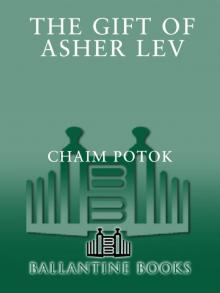 The Gift of Asher Lev
The Gift of Asher Lev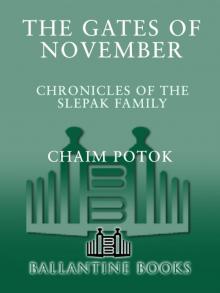 The Gates of November
The Gates of November In the Beginning
In the Beginning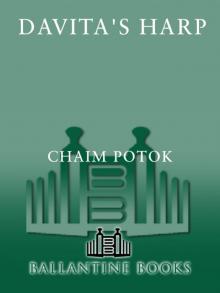 Davita's Harp
Davita's Harp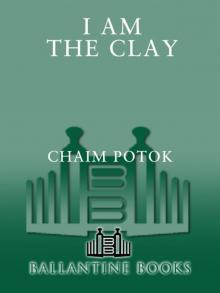 I Am the Clay
I Am the Clay The Promise
The Promise The Chosen
The Chosen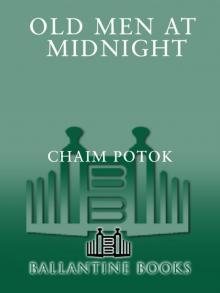 Old Men at Midnight
Old Men at Midnight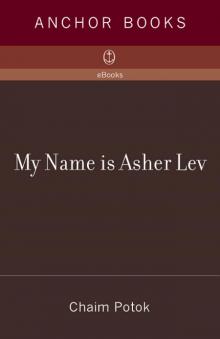 My Name Is Asher Lev
My Name Is Asher Lev